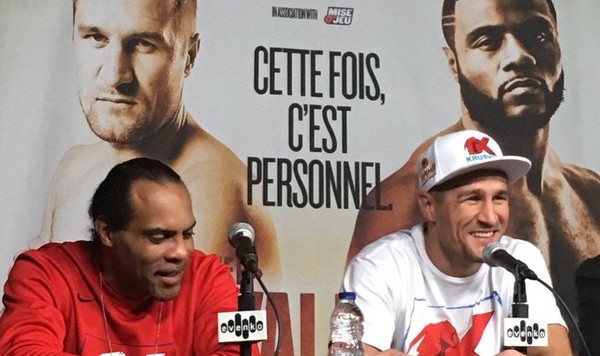There has always been something sinister about light heavyweight knockout artist Sergey Kovalev, just like there has always been a language impediment when it comes to understanding him. Whereas another knockout king, Kazakhstan’s Gennady Golovkin, has always maintained an affable, happy-go-lucky demeanor outside the ring before turning into a full-on beast inside of it, Kovalev’s menace is always lurking. Even in moments of good nature, where you can find “The Krusher” laughing, it’s there, just below the surface — like he’s trying to decide whether he should harm someone or not.
On Dec. 5, 2011, Kovalev hammered away on his countryman Roman Simakov until his corner threw in the towel in the 7th round. Simakov lost consciousness soon after, and never regained it. He died a few days later. Kovalev would eventually work his way into the upper ranks of the 175-pound division, knocking out everybody he faced. His reputation as a fearsome beast followed him. He beat the shit out of Ismayl Sillah in 2013, taunting him as Sillah lay prone on the mat. Sillah had apparently talked poorly of Kovalev before the fight, and that, folks, is a big no-no. Kovalev talked of “punishing” him. He uses that word frequently.
He used it again before last Saturday’s pointless rematch with Jean Pascal, a fighter with whom he engaged in a fun-but-mostly-one-sided slugfest in early 2015. Pascal was furious that referee Luis Pabon had stopped the first contest, and after a lackluster effort against Yunieski Gonzalez, and with Kovalev having nowhere else to go, he got his wish for a do-over. The build-up was ugly. Pascal took Kovalev to task, calling him a racist, accusations Kovalev had heard before. He once again promised punishment. Once again, he delivered it. The fight wasn’t even remotely competitive, as some of us had a feeling it wouldn’t be. Pascal never seemed right against Gonzalez, and on this night, while his fast right hand and iron chin remained, pretty much everything else abandoned him.
But Kovalev fought with considerably less urgency than in the first go-around. He would land hard, violent shots to the side of Pascal’s head and midsection, and then he’d back off. He was mostly batting the bunny around. Why? Did he want to avoid a hard right-hand counter shot, ones that he swallowed in the first fight? Or did he simply want to take his time? Did he want to prolong the pain? His answer came in the post-fight interview with Max Kellerman. He wanted to hurt. To punish. He did both.
His English is still quite iffy. He could quite possibly be trying to articulate things that he simply can’t get across. Still, his reputation seems to have boiled past the tipping point for onlookers (maybe Max Kellerman included) on Saturday. Boxing is a beautiful, yet sometimes lethal sport. For some, the fact that Kovalev enjoys inflicting pain is too much to enjoy. To them, it crosses a line from sport to savagery. But to paint Kovalev as an Ivan Drago-type seems a bit reductive. Is he vicious? Absolutely, and not a little terrifying. But there is some evidence to prove that he’s not a murderous psychopath, either. He actually tried to touch gloves with Pascal during the fight, when the two combatants got tripped up on each other. Pascal would have none of it. He became chummy with Bernard Hopkins after their fight. And then there’s the case of Adonis Stevenson, who stormed into the ring after Kovalev referred to him as “Adonis Chickenson,” and then made an attempt at chicken noises that seemed to confirm that he has never actually heard a chicken.
Now, in this writer’s opinion, if Kovalev were in fact an unhinged lunatic, he would have launched a straight right hand at Stevenson’s dome and incited a riot. He did not. Instead, he gave him the ol’ finger salute and walked away. His hatred of Stevenson is clear, but Kovalev is also clear-headed. He’s also not the only fighter to admit to administering some extra brutality in a fight. The normally mild-mannered Terence Crawford was so irked by Dierry Jean’s comments before their fight this past October that he fired bombs mercilessly until the fight was stopped. After the fight, Max asked Crawford why he was so “amped up.” His response was an instant classic.
In the “hurt” business, there are those who will be hurt, and there are those who will enjoy doing the hurting. Kovalev falls into that category. He loves his job. The fact that he’s so damn good at it makes his demeanor all the more frightening. In cases where he is matched tough, like when he fought Hopkins, it makes for compelling action. Hopkins, whose ring acumen is nearly unmatched, was soundly beaten, but he made it to the final bell. However, when Kovalev is fighting guys who shouldn’t be in the ring with him, and no offense to the tough-as-nails Pascal but he’s one of them, bad things are going to happen.
Unfortunately, bad things have been happening to a lot of light heavyweights, because Kovalev is a great fighter. Stevenson might be great, but he’s been wasting his late-thirties fighting opponents similar to those of Kovalev — no-hopers. Andre Ward is, at his best, a brilliant fighter. Maybe the best in the world. Word is that a Kovalev-Ward fight will be happening late this year. It’s a fantastic fight for the division, and for all of boxing. But we should fear for whomever Kovalev fights in the interim, because that fighter will be there to lose.
And to whomever that guy is — for the love of god, don’t piss him off.
(Sergey Kovalev, with trainer John David Jackson at left; via)

